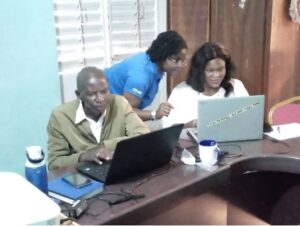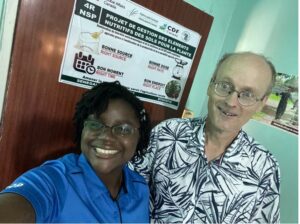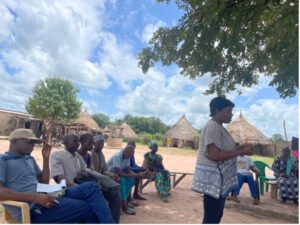The VOICE for Women and Girls project is a gender and economic empowerment initiative collaborating with women-led and women-focused co-operatives in five African countries. The aim is to send volunteers abroad to assist in responding to the needs identified and to increase and support more inclusive, sustainable, and resilient growth.
Volunteers Lois Ifekwe and Garth Harman from the VOICE Women and Girls program share their experiences, learnings and challenges.

Lois Ifekwe, Senegal
The volunteers worked with the 7A group in Senegal. They are a not-for-profit agricultural group that promotes farming development and training in sustainable management of natural resources. Their focus is on food and nutrition security, the promotion of gender equality measures and practices, and economic empowerment for vulnerable groups.
Lois Ifekwe: I worked in the Kolda region of Senegal, which is in the South, for three months. The place is not as infrastructurally developed as the capital or the surrounding regions, but it remains vibrant and bustling, filled with warm, welcoming people and breathtaking scenic views. I was teamed with VOICE Volunteer Garth Harman, who was here during the beginning of my mandate. We worked on introducing the local partner to using Microsoft Access to create streamlined Microsoft Excel report sheets.
Garth gave an introductory tutorial on how to import Excel sheets and turn them into digestible reports. I also had the opportunity to go to the field and meet some women from one of the co-ops CDF Canada and the local partner supporting their agricultural and economic development efforts. We spoke with them about their achievements and some issues they are encountering in marketing and increasing capital and gender equality efforts in their communities. Esther Mintah, the Gender Specialist from Ghana, divided the women into groups and conducted a questionnaire to identify their needs and brainstorm solutions.
One of the challenges we faced in the office was the language barrier for my colleague Garth. The official translator was unavailable during that time, so I had to work through a learning curve of explaining technical terms and directions I had scarcely encountered before in both languages.
Another challenge was on the field, learning about the state of gender affairs in the community. Senegal is a predominantly traditional patriarchal population, and especially in rural communities, a lot of men and husbands don’t believe women and their wives should hold positions of power or stay away from the house and their children for too long, even if she is bringing in business for the family.
While understanding and compassionate of cultural and religious norms, we encouraged the women and men present to persist in gender equality measures in their community.
For example, women are not generally elected or respected in positions of power because some men and women believe women are not adequately educated to hold positions of power. At the same time, this has some truth because women are subtly discouraged from pursuing further education. This is also part of the issue; by emphasizing marriage – especially at a young age – instead of pursuing knowledge, it reinforces the idea that women are not adequate for leadership.
Solutions to these issues are promoting and encouraging women to pursue their education. Also, speaking with the community men about being more responsive to women leaders by outlining the benefits they and their community can profit from them. Another major obstacle women political leaders face is generating capital for their campaign; we noted how CDF Canada could help either find investors or stakeholders for the local women leaders or train them in financial literacy and management so they can build credit on their own.

Lois Ifekwe and Garth Harman
Overall, I greatly enjoyed my time in Kolda, all the dear friends I made and the experiences I gained. I am deeply grateful to CDF Canada and the work they do to connect people from different parts of the world to these wonderful, enlightening opportunities, and I hope more people find ways to be of service to humanity.
Garth Herman: I was fortunate to get the opportunity to go to Koldo, Senegal, in July 2022 to assist with this project. Even though my French still needs improvement, I was still able to assist. I managed to provide some database training for 7A organization, with translation help from Lois Ifekwe (a volunteer with CDF from Canada) and Mathias (an employee of CDF Canada in Senegal).
7A stands for Appui à l’autoformation des adultes appliqué à l’action par alternance et en alternative/passage incontournable
Which in English means:
Appui – Support
Autoformation – Self-study
Adultes Appliqué à l’Action – Adults Apply to Action
Alternance – Always changing
Alternative/Passage incontournable – Finding alternatives

Lois Ifekwe
I presented to the 7A board some concepts that are helpful with strategic planning. Remotely, back in Canada, I had the opportunity to review their strategic plan and make a few suggestions about possibilities for the new one they will be creating soon.
A couple of side effects, since my stay overlapped by a week with Lois, we had a chance to share concepts and ideas. We also had the opportunity to chat with various people that Mathias knew, including one of the project managers with Caurie-Microfinance.
It’s always difficult to assess how much of a difference we make in organizations and people’s lives. But doing something is usually better than doing nothing, and the more we share, the more we experience, and the more we try, the more likely we are to shape our world into a better place.
Bonne chance mes amis